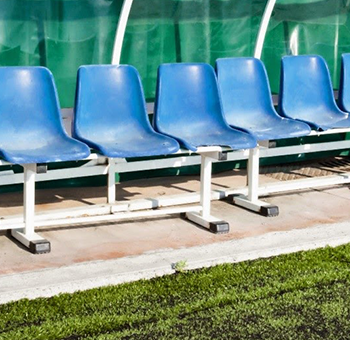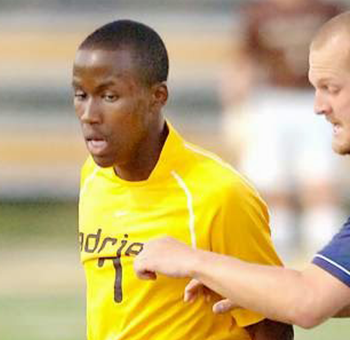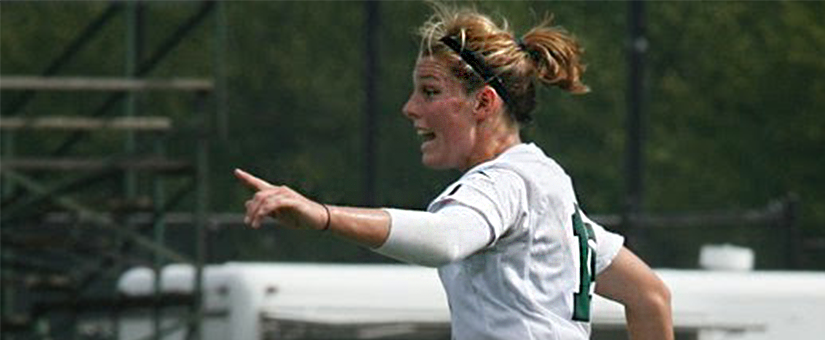
Overcoming Injury Setbacks Through a Mental Skills Program
The Value of Mental Skills Training in Collegiate Soccer (Part 1 of 3)
Part 1: Jessi McCloy
In this three part series we take a look at how three former collegiate student-athletes benefited from a structured mental skills training program in their sport performance, injury rehabilitation, and life.
Jessi McCloy
Current Position: Assistant Director of Development
University of South Dakota
A former Division 1 collegiate soccer player, all-league performer, two-year team captain, and Cleveland State University SAAC President. She has served an internship at Laurel School Athletics Department in Shaker Heights, Ohio. She worked for the department of student life and graduation admissions while earning her master’s degree at Cleveland State.
McCloy also worked at National Association of Collegiate Directors of Athletics (NACDA) during the 2012-13 academic year. While at NACDA, McCloy worked with membership, the Collegiate Event and Facility Management Association, Division I-AAA Athletic Directors Association, the John McLendon Minority Foundation, International Collegiate Licensing Association and the Learfield Sports Directors’ Cup.
Recently I was able to chat with Jessi McCloy about how she was able to overcome serious injuries and become a dominant Central Defender in Division 1 women’s soccer by working diligently on her mental toughness. What follow is the interview.
Derrek Falor (DF) – I met you as a freshman in college when you were coming back from your first ACL injury. At the time you seemed like you were in a quandary about whether to play soccer in college or not. What made you decide to take on the challenge of playing in college?
Jessi McCloy (JM) – I have always been a competitor. I knew I could do it and had to prove to myself that I was good enough, despite suffering the injury. I knew I wanted to compete at the Division I level. Once my mind was made up, I went for it.
DF – Talk to me about how high school differs from college in a broad sense.
JM – As a high school student, your biggest worry is graduating and being accepted into college and playing the sport you love. Once you are there, your biggest worries are if your friends are in the same classes, how often can I miss a class and will I be a starter as an underclassman. I never thought my mental ability would be pushed to the limits just as much as my physical ability. Soccer is an intense sport that requires extreme endurance, speed, team unity and knowledge of the game. I never knew that I would be pushed to my mental limits.
DF –Can you tell me specifically when you learned you would need to become stronger mentally?
JM – I never knew how important mental and visual preparation was as an athlete until I suffered my first ACL injury. This injury eliminated many of my Division I playing options. In order to reach my goal of playing at a Division I institution, I had to push myself. When I saw the success I had through physical therapy, I knew I had to train my mind the same way I was training my muscles. I believed that I could come back and play, I visualized the dream and I told myself I could do it.
DF – What would you say to other players out there who are injured or are coming back from injuries?
JM – Although going through multiple injuries is not the thrill of the lifetime, I am glad I had the opportunity to go through these injuries and learn how important the physical rehab AND mental rehab is to coming back 100%. In my years as an athlete, I tore two ACL’s, a meniscus and had ankle ligament reconstruction surgery. The key to coming back is taking the time to heal fully, balancing patience with ‘go get it’ mentality and diligently sticking with both physical and mental rehab all the way through. You HAVE to tell yourself that although it is hard, you can do it and you will come back stronger. I am a huge proponent of positive affirmations and the importance of quality thoughts. You have to be able to retrain your muscles and your thoughts! I feel a lot of athletes may forget to retrain their thoughts and that is why they may not come back from an injury and reach their potential.
DF – How did your ACL injury affect you as a player? When do you start to learn about the importance of a mental skills program?
JM – As a senior in high school, my first ACL injury was like a wake up call, which sounds ridiculous. It gave me motivation and made me see my full potential. Throughout the rehab process I was always just so excited to step back onto a field, I didn’t think about anything else. But my senior year of college when I tore my ACL again, I felt lost. Never in a million years did I think I would get injured again, that is when I knew mental skills program was even more crucial getting through that second injury. I was strongly encouraged to see a sports psychologist by my coach. At first, I was opposed, wondering how on earth this could help me. As sessions went on, I grew more cognitive of my thoughts, which helped me better prepare for my physical therapy. I became more confident as a player and person.
DF – Was there anything in specific that you were working on with your sport psychologist that really helped you?
JM – We found very early that I was so hard on myself, which lead me to push myself too hard and not appreciate the daily gains I was making during the process. While rehabbing my knee, this was a problem. I had to take it slower and appreciate the daily progress if I wanted to come back 100%. I did come back 100%, but not without other obstacles. In soccer, the most prevalent injuries in women are ACL tears and concussions. Since I tore my ACL twice, my chances of tearing it a third time increased tremendously, if I didn’t do it the right way. Dealing with the thoughts that I would tear it a third time was the most challenging, but the most rewarding.
DF – How did the second ACL rehab differ from the first?
JM – The first tear, I was just focused on rehabbing my knee and not so much my thoughts. I didn’t think that coming back from an injury had anything to do with mental toughness. Once I got to college and began working with you, I began to realize that our thoughts are more powerful than we know. After my second injury, I was able to work my way through the thoughts of re injuring and ended up having a pretty terrific senior year of soccer.
DF – Why do you think it was the most rewarding? How did overcoming this fear help you succeed as a collegiate player?
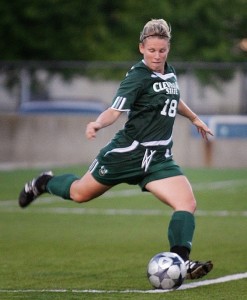
JM – This was the most rewarding because not only was I extremely successful as an individual, our team was extremely successful and posted the best year yet. As a captain, I knew that if I did overcome my fears of re-injury, I would not be able to be as successful in guiding my team the way I knew I could. I succeeded as a player AND an individual. I still practice mental toughness, positive affirmations and visualizing.
DF – Did learning how to visualize during your therapy help you on the field in any way?
JM – Visualizing helped a lot, especially with my offensive attacks. I would draw pictures of scoring goals, and I did! I was the prime target on set pieces and corners so I practiced visualizing scoring off headers constantly. I visualized giving my all on the field, playing with confidence on the ball, and being successful, every single day. I was able to walk off the field and say I did everything I could to help us succeed.
DF – Are there other specific aspects of mental skills training that helped you become the dominate player you were as a senior?
JM – I have always been the player to wear my heart on my sleeve. You always said this was one of my BEST attributes, but could be even better if I could control that. My senior year, I was able to handle my emotions in a positive way and use them effectively to enhance my on-field play. I did breathing exercises before games to keep me calm and focused. I read my goals before every practice and game and BELIEVED them. I may not have reached a specific goal at times, but I either learned something new or was able to add a new goal to the list. Games were all about me maintaining my mental focus on the variable I could control. Once the game starts, all of that planning can fly out the window, if I didn’t keep my emotions in check! As a leader on the back line If something wasn’t clicking with the defense, I felt the confidence to pull them together quick and get it figured out. I was able to do this because my emotions were in control before I stepped on the field. No matter what happened during the game, I was able to control what I knew I could control: my emotions, my mental toughness and my game! This is how a structured mental skills program helped me. I learned when I am tough mentally, I am a bigger threat as a soccer player.
DF – Overall, how do you think you have benefited as a person and athlete through the improvement of your mental skills?
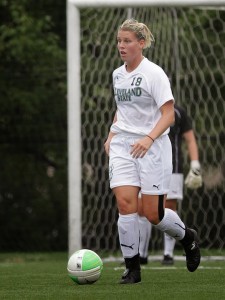
JM – Not only had the preparation of mental toughness helped in soccer, but it had also helped in my everyday activities. I had once been a negative person, but just towards myself. I was so hard on myself and was never able to grow because my negative thoughts held me back. This changed and I owe a lot to you for that. If you had not aided me through the process, who knows how many injuries and mental setbacks I could have endured. Now, I am a more mentally tough person.
DF – Tell us a bit about how you compete now that you are done as a collegiate athlete and if you are still using the things you learned in your mental toughness training.
JM – I still compete in soccer (which I probably shouldn’t!) I just had another surgery to repair my meniscus. Unfortunately, they found arthritis in my knee, too. I took the steps of what I have learned about mental toughness and I keep reminding myself how important it is to keep a clear and focused mind. I am reading a book (Within), on mental toughness and specifically weight loss. Learning about mental toughness has made me want to educate myself more on the subject. If I can be that successful as a student-athlete, recovering some horrific surgeries, I think I can take on anything and be successful as long as I have the mental toughness I was taught!
Stay tuned for Part 2 of this 3-part series on how one former college soccer player began using a mental skills program which helped him land land a couple of professional tryout opportunities in England this summer.
Derrek Falor. M.Ed.
[email protected]
www.thrivesp.com
@derrekfalor
Derrek is the owner of Thrive: Excellence in Sport Performance, has coached college soccer for the past 20 years, has a USSF A License, is a member of the Association for Applied Sport Psychology, is undergoing professional certification through AASP, and has a Master’s Degree in Sport Psychology.
- Getting Your Intensity Level Right - March 17, 2025
- Building a Functional Resilience Plan is Vital to a Referee’s Success - February 18, 2025
- sport in a pandemic: Crisis or opportunity?Chapter 4 - December 4, 2020

